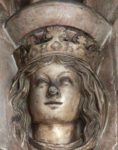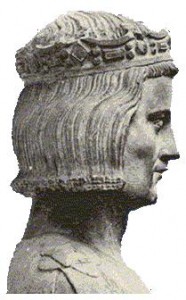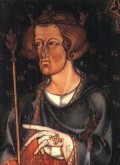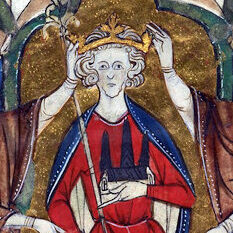Henry III (1207 – 1272)
His reign of 56 years was a time of extraordinary achievements in the arts, education and politics, much of it due to his vision to take the dull projection of power he inherited from his Norman predecessors and replace it with a more humane and open-hearted monarchy. He was the first king to rule under Magna Carta and so underwent some tough lessons to find the right balance between liberties, laws, and the crown. By time he died in 1272, England had evolved into a parliamentary state with the monarch at the head of it. He was buried in Westminster Abbey, which remains his most enduring achievement today.
Eleanor of Provence (1223 – 1291)
 Twelve years old when she came to England to marry Henry, she never saw Provence again. As queen and queen-dowager, her adopted country became her home for life. She and Henry were true and faithful to each other and were adoring parents to their five children. When he went abroad in 1253, he named her regent and it was in that capacity that she summoned the first ever elected parliament. Despite governing efficiently and having a wide circle of English friends and advisers, the church historians of her day were wary of her power and foreign origins and blamed her for the troubles that broke out between the king and rebels led by Simon de Montfort.
Twelve years old when she came to England to marry Henry, she never saw Provence again. As queen and queen-dowager, her adopted country became her home for life. She and Henry were true and faithful to each other and were adoring parents to their five children. When he went abroad in 1253, he named her regent and it was in that capacity that she summoned the first ever elected parliament. Despite governing efficiently and having a wide circle of English friends and advisers, the church historians of her day were wary of her power and foreign origins and blamed her for the troubles that broke out between the king and rebels led by Simon de Montfort.
Richard of Cornwall (1209 – 1272)
 Born two years after Henry, Richard of Cornwall was one of the wealthiest and most widely travelled men of his era. Praised for his diplomatic and organisational skills, he led the last successful crusade to the Holy Land and was elected king of Germany. When his brother-in-law Simon de Montfort raised rebellion against the regime, Richard sided with him and it costing both him and his brother. He emerged from that low point to exert what was his greatest and lasting influence on his German subjects. He took one of them as his third wife, a teenage beauty who was forty years younger than him.
Born two years after Henry, Richard of Cornwall was one of the wealthiest and most widely travelled men of his era. Praised for his diplomatic and organisational skills, he led the last successful crusade to the Holy Land and was elected king of Germany. When his brother-in-law Simon de Montfort raised rebellion against the regime, Richard sided with him and it costing both him and his brother. He emerged from that low point to exert what was his greatest and lasting influence on his German subjects. He took one of them as his third wife, a teenage beauty who was forty years younger than him.
Simon de Montfort (1208? – 1265)
 He was described as “tall in body and handsome in face.” He was also said to have a pleasant and agreeable way of speaking, which helps explain why some of the greatest men of his age were drawn to him. A descendant of two aristocratic families of northern France (and of William the Conqueror), Simon was probably born at the family seat of Montfort-l’Amaury in today’s Île-de-France between Paris and Normandy. The third son of parents renowned for their fanaticism, he spent his youth in the south of France, a witness to his father’s use of fire and sword in the Albigensian Crusade.
He was described as “tall in body and handsome in face.” He was also said to have a pleasant and agreeable way of speaking, which helps explain why some of the greatest men of his age were drawn to him. A descendant of two aristocratic families of northern France (and of William the Conqueror), Simon was probably born at the family seat of Montfort-l’Amaury in today’s Île-de-France between Paris and Normandy. The third son of parents renowned for their fanaticism, he spent his youth in the south of France, a witness to his father’s use of fire and sword in the Albigensian Crusade.
Eleanor de Montfort (1216 – 1275)
Born just before or after her father King John died, Eleanor was a widow before she was twenty. Under the influence of a pious governess, she became a nun, but had retained all her beauty and willfulness when she met a dark, ambitious newcomer at court. Simon’s later pangs of conscience suggest their passion had got the better of them before they were married. Together they brought seven children into the world, as loving and loyal a family as Henry had with his Eleanor. Often chastised for extravagant living, she left for exile in France after her husband’s defeat, taking with her the roll of her household accounts, which would later provide a valuable look into medieval home management.
Robert Grosseteste (1175 – 1253)
 The bishop of Lincoln, Grosseteste was a learned clergyman at home in science, mathematics and Aristotle. His Rules and other writings, where he stressed the importance of official conduct, left their mark on the reforms of 1258. His zeal to reform the church as well led him to complain to Pope Innocent IV that all the ebb and flow of money and nepotism were undermining the spiritual needs of the flock. Enraged at being lectured to, the pope wanted Henry to lock up the defiant troublemaker. He was eventually dissuaded by his cardinals, who reminded Innocent that not only was the old bishop right, but he was a better man of the cloth than any of them.
The bishop of Lincoln, Grosseteste was a learned clergyman at home in science, mathematics and Aristotle. His Rules and other writings, where he stressed the importance of official conduct, left their mark on the reforms of 1258. His zeal to reform the church as well led him to complain to Pope Innocent IV that all the ebb and flow of money and nepotism were undermining the spiritual needs of the flock. Enraged at being lectured to, the pope wanted Henry to lock up the defiant troublemaker. He was eventually dissuaded by his cardinals, who reminded Innocent that not only was the old bishop right, but he was a better man of the cloth than any of them.
Louis IX (1214 – 1270)
 Better known today by the places named after him, Saint Louis became the ninth in the series after inheriting the throne of France from his equally septic father. His desire for justice and fairness were renowned throughout Europe, yet he embarked on two disastrous crusades, the last of which claimed him and most of his family, and his devoutness inflicted untold misery on Jews and heretics alike. Louis’ own reforms, while distinctly religious in nature, had great influence across the Channel. He was called in to arbitrate between Henry and the rebellious barons but came out so solidly behind his brother-in-law that his award all but guaranteed civil war in England.
Better known today by the places named after him, Saint Louis became the ninth in the series after inheriting the throne of France from his equally septic father. His desire for justice and fairness were renowned throughout Europe, yet he embarked on two disastrous crusades, the last of which claimed him and most of his family, and his devoutness inflicted untold misery on Jews and heretics alike. Louis’ own reforms, while distinctly religious in nature, had great influence across the Channel. He was called in to arbitrate between Henry and the rebellious barons but came out so solidly behind his brother-in-law that his award all but guaranteed civil war in England.
Edward I (1239 – 1307)
 Edward’s birth was a cause for great joy. The queen had at last given the country an heir, named after the great Confessor no less. Then, it was rumoured, Henry spoiled the occasion by demanding expensive gifts from his subjects, as if for a job well done. Enthusiasm for the young prince began to wear thin when he proved to be a reckless youth with no more respect for the law than his father had. He sparred with his parents in the run-up to the reform period, coming for a time under the influence of his uncle Simon. Shrewd, devious, with unlimited energy, Edward cost the royalists the battle of Lewes but made up for it by escaping and forcing the final showdown with de Montfort at Evesham.
Edward’s birth was a cause for great joy. The queen had at last given the country an heir, named after the great Confessor no less. Then, it was rumoured, Henry spoiled the occasion by demanding expensive gifts from his subjects, as if for a job well done. Enthusiasm for the young prince began to wear thin when he proved to be a reckless youth with no more respect for the law than his father had. He sparred with his parents in the run-up to the reform period, coming for a time under the influence of his uncle Simon. Shrewd, devious, with unlimited energy, Edward cost the royalists the battle of Lewes but made up for it by escaping and forcing the final showdown with de Montfort at Evesham.
Frederick II (1194 – 1250)
 More Sicilian than German, Frederick’s independence and free-thinking irked the papacy to no end. He protected Jews and Muslims, patronized the arts and sciences, and the literature of his court in Palermo heavily influenced the development of modern Italian. While contemporaries called him stupor mundi (the wonder of the world), Pope Gregory IX called him the Antichrist for failing to fall into line. For all his greatness, Frederick did not leave a good physical impression on one witness who saw him in Jerusalem: the emperor was bald, covered with red hair, and had he been a slave, would have fetched pittance at the market.
More Sicilian than German, Frederick’s independence and free-thinking irked the papacy to no end. He protected Jews and Muslims, patronized the arts and sciences, and the literature of his court in Palermo heavily influenced the development of modern Italian. While contemporaries called him stupor mundi (the wonder of the world), Pope Gregory IX called him the Antichrist for failing to fall into line. For all his greatness, Frederick did not leave a good physical impression on one witness who saw him in Jerusalem: the emperor was bald, covered with red hair, and had he been a slave, would have fetched pittance at the market.
Alfonso X (1221 – 1284)
 This king of Castile earned the nickname el Sabio, or the Wise, because he was a poet, astrologer, and lawgiver, the ruler who promoted Castilian over Latin and had the great books of Arabic and Jewish learning translated for vernacular use. He was also something of a troublemaker. Alfonso invaded Portugal, fomented the civil unrest in Gascony that Simon had to deal with, and nearly ruined his economy in an attempt to outbid Richard of Cornwall for the title King of the Romans. His nobility finally had enough and forced him to end his days in close confinement with the great music and literature he helped to foster.
This king of Castile earned the nickname el Sabio, or the Wise, because he was a poet, astrologer, and lawgiver, the ruler who promoted Castilian over Latin and had the great books of Arabic and Jewish learning translated for vernacular use. He was also something of a troublemaker. Alfonso invaded Portugal, fomented the civil unrest in Gascony that Simon had to deal with, and nearly ruined his economy in an attempt to outbid Richard of Cornwall for the title King of the Romans. His nobility finally had enough and forced him to end his days in close confinement with the great music and literature he helped to foster.


